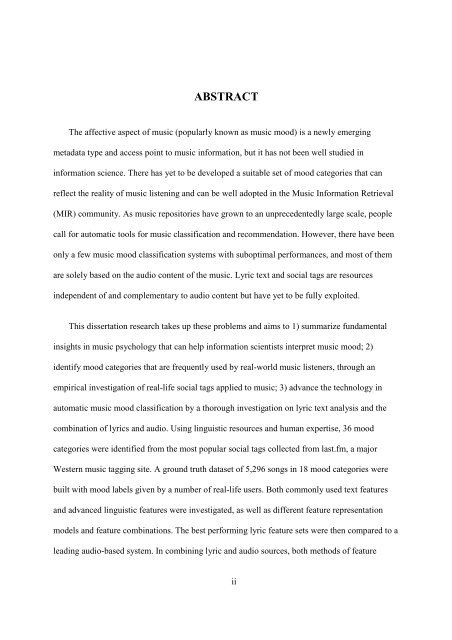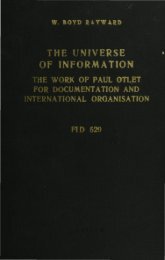improving music mood classification using lyrics, audio and social tags
improving music mood classification using lyrics, audio and social tags
improving music mood classification using lyrics, audio and social tags
You also want an ePaper? Increase the reach of your titles
YUMPU automatically turns print PDFs into web optimized ePapers that Google loves.
ABSTRACT<br />
The affective aspect of <strong>music</strong> (popularly known as <strong>music</strong> <strong>mood</strong>) is a newly emerging<br />
metadata type <strong>and</strong> access point to <strong>music</strong> information, but it has not been well studied in<br />
information science. There has yet to be developed a suitable set of <strong>mood</strong> categories that can<br />
reflect the reality of <strong>music</strong> listening <strong>and</strong> can be well adopted in the Music Information Retrieval<br />
(MIR) community. As <strong>music</strong> repositories have grown to an unprecedentedly large scale, people<br />
call for automatic tools for <strong>music</strong> <strong>classification</strong> <strong>and</strong> recommendation. However, there have been<br />
only a few <strong>music</strong> <strong>mood</strong> <strong>classification</strong> systems with suboptimal performances, <strong>and</strong> most of them<br />
are solely based on the <strong>audio</strong> content of the <strong>music</strong>. Lyric text <strong>and</strong> <strong>social</strong> <strong>tags</strong> are resources<br />
independent of <strong>and</strong> complementary to <strong>audio</strong> content but have yet to be fully exploited.<br />
This dissertation research takes up these problems <strong>and</strong> aims to 1) summarize fundamental<br />
insights in <strong>music</strong> psychology that can help information scientists interpret <strong>music</strong> <strong>mood</strong>; 2)<br />
identify <strong>mood</strong> categories that are frequently used by real-world <strong>music</strong> listeners, through an<br />
empirical investigation of real-life <strong>social</strong> <strong>tags</strong> applied to <strong>music</strong>; 3) advance the technology in<br />
automatic <strong>music</strong> <strong>mood</strong> <strong>classification</strong> by a thorough investigation on lyric text analysis <strong>and</strong> the<br />
combination of <strong>lyrics</strong> <strong>and</strong> <strong>audio</strong>. Using linguistic resources <strong>and</strong> human expertise, 36 <strong>mood</strong><br />
categories were identified from the most popular <strong>social</strong> <strong>tags</strong> collected from last.fm, a major<br />
Western <strong>music</strong> tagging site. A ground truth dataset of 5,296 songs in 18 <strong>mood</strong> categories were<br />
built with <strong>mood</strong> labels given by a number of real-life users. Both commonly used text features<br />
<strong>and</strong> advanced linguistic features were investigated, as well as different feature representation<br />
models <strong>and</strong> feature combinations. The best performing lyric feature sets were then compared to a<br />
leading <strong>audio</strong>-based system. In combining lyric <strong>and</strong> <strong>audio</strong> sources, both methods of feature<br />
ii
















